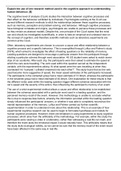Explain the use of one research method used in the cognitive approach to understanding
human behaviour. [8]
The cognitive level of analysis (CLoA) studies the interaction between cognitive processes and
their effect on the behaviour exhibited by individuals. Psychologists working at the CLoA use
several different research methods to elicit the relationships between these cognitive processes,
such as memory, perception and problem-solving, and behaviour. Although cognitive processes
have biological correlates and origins, psychologists are unable to perceive these processes and
so they remain as abstract models. Despite this, one principle of the CLoA states that the mind
can and should be investigated scientifically, in order to take an empirical and unbiased view on
the concept of cognition, and therefore scientific methods such as laboratory experiments are
common at the CLoA.
Often, laboratory experiments are chosen to uncover a cause and effect relationship between a
cognitive process and a specific behaviour. This is exemplified through Loftus and Palmer’s study
[1974], which aimed to investigate the effect of leading questions on the reliability of memory.
Leading questions are designed to encourage a particular answer from the participant through
eliciting a particular schema through word association. 45 US student were asked to watch seven
clips of car accidents. After each clip, the participants were then asked to estimate the speed at
which the cars were travelling. The verb used within this question served as the independent
variable, with the experimenters asking ‘At what speed were the cars travelling at when they
(contacted/ hit / bumped / collided/ smashed) into each other?’. The study found that as the verb
used became more suggestive of speed, the mean speed estimates of the participants increased.
The participants in the contacted group had a mean estimate of 31.8mph, whereas the participants
in the smashed group had a mean estimate of 40.8mph. One explanation for these results is that
the different verbs used within the leading question trigger different schemas associated with the
car’s speed and the severity of the action, thus influencing the participant’s memory of an event.
The use of a strict experimental method allows a cause and effect relationship to be established
between the schemas associated with a particular word used in a leading question, and the
perceived memory recall of the event. However, this methodology is unable to conclude whether
this is due to response-bias factors, whereby the information provided within the leading question
simply influenced the participants’ answers, or whether it was able to completely reconstruct the
mental representation of the memory. Loftus and Palmer carried out further scientific
experimentation in order to understand more about this relationship. This is an example of how
experimental cognitive research can be used to begin to formulate hypotheses and models for
human cognitive processes. However, there are limitations in using experiments to study cognitive
processes, which arise from the artificiality of the methodology. For example, within this study the
participants were viewing a video in a laboratory, rather than witnessing a real life car crash, and
therefore the event lacks the emotional impact it would naturally have. This artificiality means that
the study lacks ecological validity, as we cannot be sure that the memory recall of the event would
have been affected in the same way in real life.




